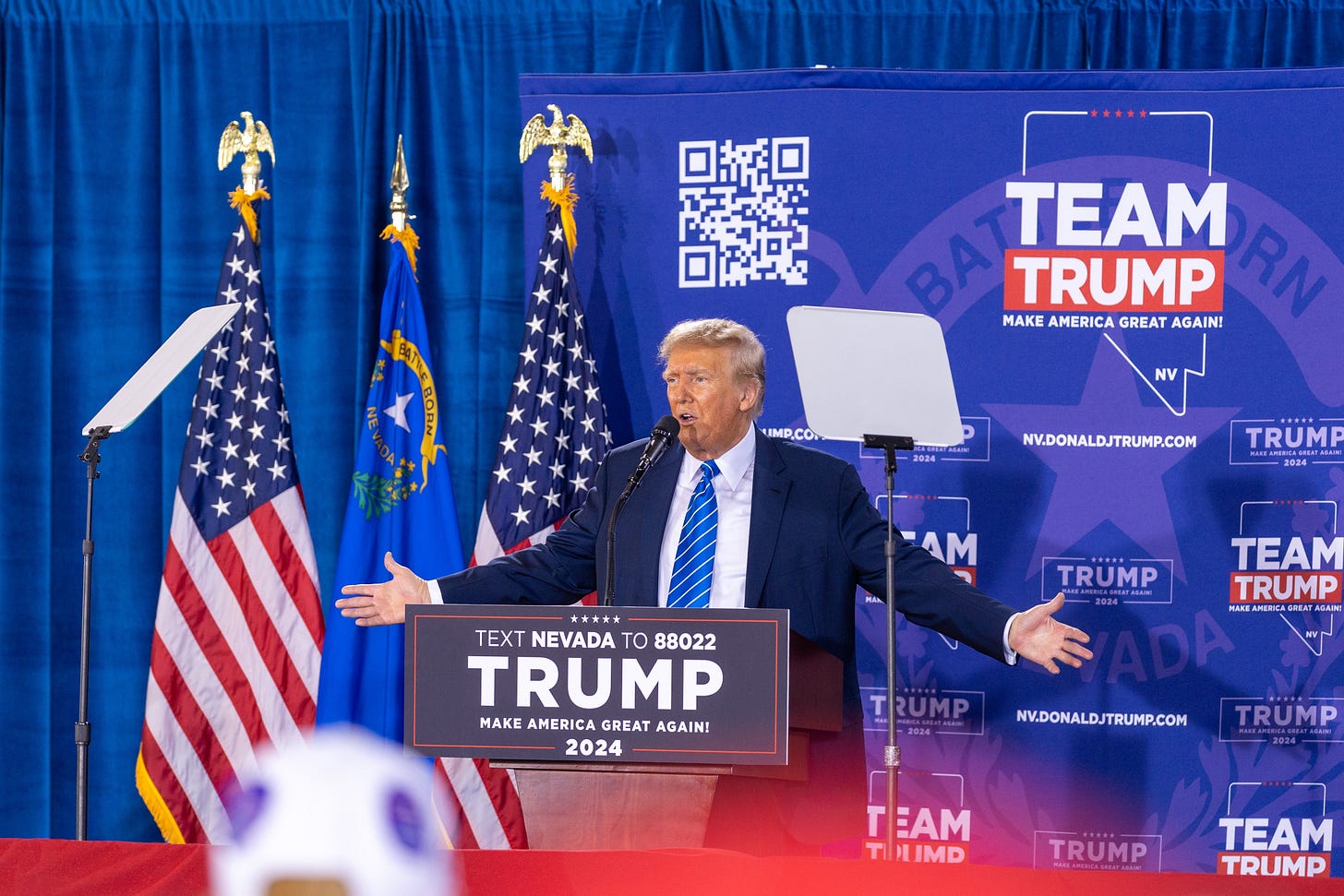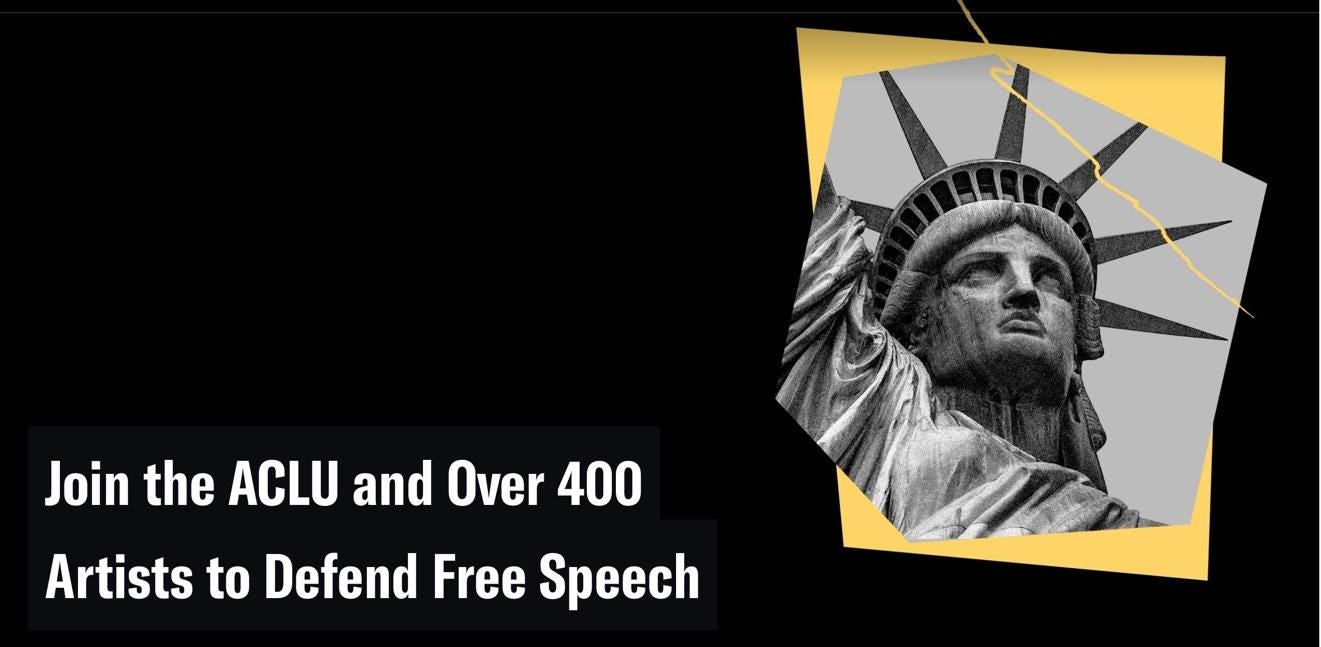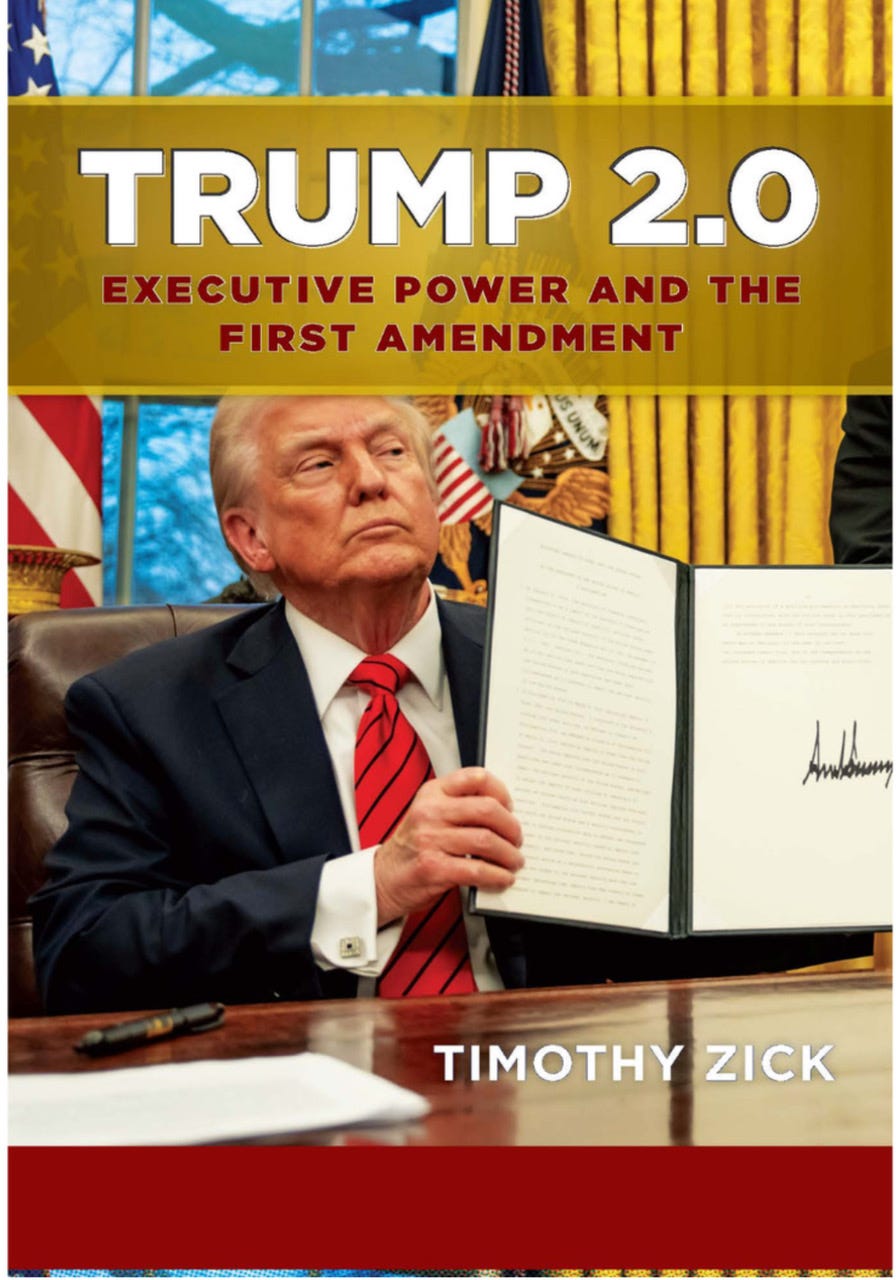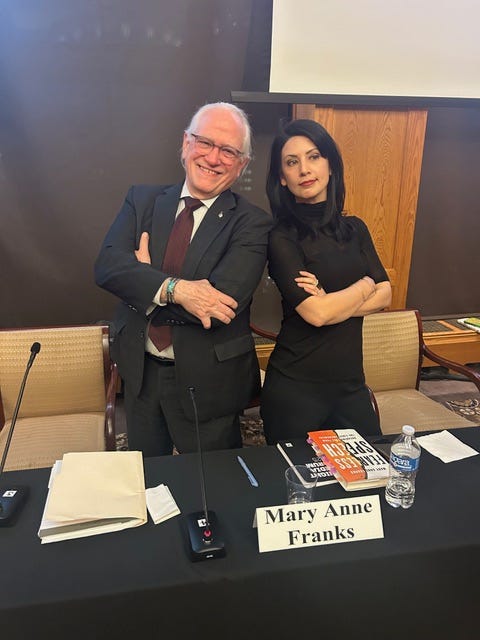The upshot of buckshot: The targets affected beyond Trump’s New York Times/Penguin-Random House lawsuit
First Amendment News 487
“I’m winning, I’m winning the cases,”
— President Donald Trump (Sept. 19)
“The complaint is [a] decidedly improper and impermissible attempt to attack the President’s adversaries.”
— Judge Steven D. Merryday (Sept. 19)
Can the president’s and the judge’s statements be reconciled? They appear, after all, to contradict one another, making it seemingly impossible for both to be true at the same time. Then again, countless rounds of scattered buckshot can hit more than one target at the same time. By that logic, even a “miss” of a designated target can still hit other similarly situated targets in the fallout area.
Hence, even if Trump loses a particular defamation case, he nonetheless can succeed in chilling the speech of others afraid to cross him. In that sense, then, Trump can win even when he loses — a triumph of subjugation over logic.
Trump’s legal hitman
When Alejandro Brito filed his 85-page complaint in Trump v. New York Times and& Penguin Random House on Sept. 15th, he probably did not expect a prompt and scathing judicial reply. Yet just such a response came. Consider the following statements from Judge Steven Merryday’s order:
“This complaint stands unmistakably and inexcusably athwart the requirements of Rule 8” of the Federal Rules of Civil Procedure.
“As every lawyer knows (or is presumed to know), a complaint is not a public forum for vituperation and invective — not a protected platform to rage against an adversary.”
“The reader of the complaint must labor through allegations, such as ‘a new journalistic low for the hopelessly compromised and tarnished ‘Gray Lady.’’”
“Although lawyers receive a modicum of expressive latitude in pleading the claim of a client, the complaint in this action extends far beyond the outer bounds of that latitude.”
“The reader must endure an allegation of ‘the desperate need to defame with a partisan spear rather than report with an authentic looking glass.’”
Judge Merryday rejected the “tedious and burdensome” complaint but gave the Plaintiff 28 days to file an amended one, which must not exceed 40 pages. (See also: Tim Zick, “Judge dismisses Trump defamation complaint against The New York Times and Penguin”)
Mr. Brito is also representing the president in two other defamation actions: Trump v. Dow Jones and Co. (pending) and Trump v. Cable News Network, Inc. (motion to dismiss granted). Mr. Brito, however, secured a settlement in the Trump v. ABC News & George Stephanopoulos defamation case.
The buckshot effect on other parties
“I spent a couple of bucks on legal fees, and they spent a whole lot more. I did it to make his life miserable, which I’m happy about.”
— Donald J. Trump (March 8, 2016)
“It was nearly impossible to get anyone on camera for this story [on Trump’s attacks on lawyers and law firms], because of the fear now running through our system of justice.”
— Scott Pelle, 60 Minutes (May 4, 2025)
Whether intended or not, one real-world consequence of actions such as the $15 billion lawsuit against The New York Times is to chill others (e.g., media outlets and publishers) from saying or printing anything critical of Donald Trump. Even if Trump’s lawsuits against The Wall Street Journal, The New York Times, and Penguin Random House fail (as they probably will), they do send a threatening blast over the bow: Beware any who dare criticize Donald Trump.
Think of it. How many media outlets are likely to cross Trump when he has FCC Chairman Brendan Carr at his regulatory beck and call? How many publishers will think twice before they agree to release a book openly critical of Trump? How many will speak truth to power if they fear runaway litigation costs and other consequences for crossing Trump and his Justice Department? How many will condemn Trump’s actions if doing so has negative commercial consequences?
Bottom line: However the The Wall Street Journal and The New York Times cases, among others, the cautionary takeaway is well stated by Timothy Snyder:
[D]oing what Trump wants in advance only makes it more likely that Trump will have power, and only teaches him that you are easy to intimidate. You are giving the authoritarian power he would not otherwise have.
Related
Alanna Durkin Richer, Larry Neumeister, and Jill Colvin, “Trump sues Wall Street Journal and media mogul Rupert Murdoch over reporting on Epstein ties,” Associated Press (July 18)
Laurel Rosenhall, “Newsom Sues Fox News for Saying He Lied About Call With Trump,” The New York Times (June 27)
“Executive Watch: Trump’s weaponization of civil lawsuits,” First Amendment News 462 (March 18)
“‘The lawsuit is the punishment’: Reflections on Trump v. Selzer” First Amendment News 453 (Jan. 16)
Kimmel returns!
John Koblin and Michael M. Grynbaum, “Jimmy Kimmel, Somber but Defiant, Defends Free Speech in Return to ABC,” The New York Times (Sept. 23)
Jimmy Kimmel broke his silence on Tuesday night in an emotional return to ABC’s airwaves, by turns defiant, joking and somber as he addressed the controversy that temporarily sidelined his late-night show and set off a national debate over free speech.
His voice breaking at times, Mr. Kimmel said he understood why his comments last week about the suspected shooter of right-wing activist Charlie Kirk seemed “ill-timed, or unclear, or maybe both.” He added, “It was never my intention to make light of the murder of a young man.”
But Mr. Kimmel also had harsh words for President Trump and the government regulator who suggested that the Trump administration would punish ABC because of his remarks, saying that “a government threat to silence a comedian the president doesn’t like is anti-American.”
Two major TV operators remain undecided on Kimmel return
John Koblin, Brooks Barnes, Michael M. Grynbaum, and Benjamin Mullin, “Jimmy Kimmel’s Show to Return to ABC on Tuesday Night,” The New York Times (Sept. 22)
Jimmy Kimmel is coming back.
ABC said on Monday that “Jimmy Kimmel Live!” would return to its airwaves on Tuesday, ending an impasse that began last week.
“Last Wednesday, we made the decision to suspend production on the show to avoid further inflaming a tense situation at an emotional moment for our country,” the Walt Disney Company, which owns ABC, said in a statement.
“It is a decision we made because we felt some of the comments were ill-timed and thus insensitive,” the statement said. “We have spent the last days having thoughtful conversations with Jimmy, and after those conversations, we reached the decision to return the show on Tuesday.”
[ . . . ]
Disney did not say whether all ABC affiliates, some of which balked at carrying “Jimmy Kimmel Live!” last week, would carry Tuesday’s show.
It is still unclear whether Nexstar and Sinclair — two major television operators that own many ABC affiliates and have vowed to pre-empt “Jimmy Kimmel Live!” in the aftermath of his comments — will air future episodes of the show. Representatives for Nexstar and Sinclair did not immediately respond to a request for comment.
ACLU and 400 artists protest Kimmel’s suspension
“Join the ACLU and Over 400 Artists to Defend Free Speech,” ACLU (Sept 22)
Jimmy Kimmel was taken off the air after our government threatened a private company with retaliation for Kimmel’s remarks. This is a dark moment for freedom of speech in our nation.
This is unconstitutional and un-American. The government is threatening private companies and individuals that the President disagrees with. We can’t let this threat to our freedom of speech go unanswered.
The ACLU has partnered with hundreds of creatives, artists, and journalists to send a message that government officials can never silence us. And now, we’re calling on our whole community to join us.
Read the full letter and add your name to join us in the fight to defend our constitutional right to free speech.
Pentagon demands pledge from credentialed journalists
“Pentagon Steps up Media Restrictions, Now Requiring Approval Before Reporting Even Unclassified Info,” First Amendment Watch (Sept. 22)
The Pentagon says it will require credentialed journalists at the military headquarters to sign a pledge to refrain from reporting information that has not been authorized for release — including unclassified information.
Journalists who don’t abide by the policy risk losing credentials that provide access to the Pentagon, under a 17-page memo distributed Friday that steps up media restrictions imposed by the administration of President Donald Trump.
“Information must be approved for public release by an appropriate authorizing official before it is released, even if it is unclassified,” the directive states. The signature form includes an array of security requirements for credentialed media at the Pentagon.
Advocates for press freedoms denounced the non-disclosure requirement as an assault on independent journalism. The new Pentagon restrictions arrive as Trump expands threats, lawsuits and government pressure as he remakes the American media landscape.
Crackdown on West Point’s academic freedom
Larry Neumeister, “West Point violating First Amendment with professor crackdown: Lawsuit,” Army Times (Sept. 22)
The U.S. Military Academy at West Point is banning opinions by professors in the classroom and some books and courses in a crackdown that violates the First Amendment, a law professor at the military school said in a lawsuit Monday seeking class action status.
Tim Bakken filed the lawsuit in Manhattan federal court and named the school and its leaders as defendants. He said he wants to protect free speech and the right to academic freedom at an institution where he has flourished despite his public criticisms of the academy and the U.S. military.
Bakken also noted in the lawsuit that he has a contract with a publisher for a book that is critical of some aspects of West Point and doesn’t want to seek approval from the school’s leadership prior to its publication because “it is very likely such approval will be withheld.”
[ . . . ]
The lawsuit seeks class action status for West Point’s civilian faculty members, believed to be more than 100 individuals, and a court order to stop restrictions on free speech, along with unspecified damages and legal fees.
Granieri and Korzenik on South Park, parody, and the First Amendment
Susanna Granieri, “Media Attorney David Korzenik on South Park and First Amendment Protections for Parody,” First Amendment Watch (Sept. 19)
The hit animation series “South Park,” streamed by Paramount, started its 27th season in July, controversially mocking President Donald Trump by depicting him as being in a relationship with the devil. The episode, titled “Sermon on the ‘Mount,” references various real-life scenarios, including the defunding of National Public Radio; bringing Christianity into public schools; an overuse of Chat.
First Amendment Watch spoke with David Korzenik, media law attorney and former adjunct professor at The Benjamin N. Cardozo School of Law at Yeshiva University in New York City. Korzenik discussed the First Amendment protections that are applied to satirical content; explained why a lawsuit against “South Park” by President Trump would likely be unsuccessful; and argued why those who criticize the president should be immune from defamation lawsuits he might file against them.
Trump watch
Tim Zick, “Trump 2.0: Executive Power and the First Amendment,” First Amendment Watch (Updated Sept. 18)
So far, President Trump has issued 43 Executive Orders, Fact Sheets, and Presidential Memoranda that implicate or affect First Amendment rights (speech, press, and association). Those directives and policies, and related agency enforcement actions, have given rise to 55 lawsuits (or nearly 7 lawsuits for each month Trump has been in office) in which plaintiffs have pursued First Amendment claims. . .
As a general matter, the Trump Administration has been losing very badly in early lawsuits challenging the President’s directives and agency actions on First Amendment grounds. District courts have granted preliminary and, in some cases, permanent relief to many plaintiffs.
Tim Zick, “Policing Arts Funding For ‘Gender Ideology’,” Thoughts on First (Sept. 21)
The Trump Administration has lost yet another case on First Amendment grounds. This one involves the National Endowment for the Arts (NEA), which provides federal funding for a wide variety of arts projects.
New book by Tim Zick coming this December
Tim Zick, “Trump 2.0: Executive Power and the First Amendment,” Carolina Academic Press (Dec. 20)
Forthcoming book on campaign finance spending and marketplace of ideas
Nathan Katz, “Bankrupting Democracy: Campaign Spending in a Marketplace of Ideas,” University Press of Kansas (May 2026)
A deeply researched investigation that shows how the long-held ideas protecting unlimited campaign spending as free speech that once served the needs of political candidates and voters are now shaped to serve the desires of interest groups, threatening the future of American democracy.
In the 2010 Citizens United decision, Supreme Court Justice Anthony Kennedy stated that the precedent they were overturning “interferes with the ‘open marketplace’ of ideas protected by the First Amendment.” For the majority who ruled in this case, money was in some sense the equivalent of speech, meaning that spending should be allowed under the guise of a marketplace of ideas. But what does this actually mean? And what are the consequences?
Both critics and advocates of this marketplace of ideas often treat it as an abstract principle, one that focuses on competition among different voices that allows for the most popular, and therefore best, ideas to gain prominence. But the marketplace of ideas is not a single tool. There are multiple mechanisms at play, all of which influence the rules and regulations behind this competition. Therefore, the marketplace of ideas should be understood not as a single idea but as a collection of smaller norms that build a regulatory, market-like system.
Bankrupting Democracy traces the development of this system, which Nathan Katz calls the “money-speech paradigm.” Through a historical analysis of campaign finance reform discourses that have occurred within the legislative record and the Supreme Court, Katz demonstrates how these ideologies have caused radical changes to political speech. He pairs these data with an analysis of the changing patterns of political advertisers—the PACs, Super PACs, interest groups, candidates, and parties that all spend a large portion, often the majority, of their money on television advertisements. By combining these components, Katz shows how changes to the money-speech paradigm have shifted from a focus on political candidates and their right to public exposure to a system that focuses on supporting interest groups’ pursuit of social and economic dominance.
At each stage in the development of the current system, proponents of the reforms assumed the security of democratic institutions, leaving them unprotected against the consolidation of corporate power. Bankrupting Democracy illuminates this market system that threatens to unravel the very fabric of American society.
Video: Federalist Society panel on ‘Federal effort to combat antisemitism’
“Video of Education Law and Policy Panel on ‘Federal Efforts to Combat Antisemitism: Restoring Campus Civil Rights or Infringing Academic Freedom?’” The Volokh Conspiracy (Sept. 19)
Cato to host exchange between Mary Anne Franks and Robert Corn-Revere
Online platforms have created unprecedented opportunities for individuals to share ideas and reach wider audiences. Supporters of these platforms point to how they have reduced barriers to participation, providing new and creative opportunities for discourse and connection. Critics, however, raise concerns that these platforms can allow the spread of misinformation, the amplification of offensive speech, or the power of private companies to shape which voices are heard and which are silenced. The internet has become a central arena in debates about the scope and limits of free expression.
The United States has long valued the First Amendment’s broad protections, but public support is waning. A 2024 Freedom Forum poll found that only 58 percent of Americans would ratify it today — down five points in four years. Critics argue that certain types of speech, while legal, can cause harm or suppress the voices of vulnerable groups. Free speech advocates warn that narrowing protections will risk government censorship and shrink the space for open debate.
This tension raises an important question: Are current interpretations of the First Amendment sufficient to safeguard free expression in the digital age? To mark Free Speech Week, we are hosting two prominent scholars to debate this issue.”
Participants: Mary Anne Franks, Robert Corn-Revere, and Jennifer Huddleston
Date & Time: Oct. 21, 5:30-6:30 p.m. ET
Location: Cato Institute, 1000 Massachusetts Ave, NW, Washington, D.C.
‘Shine a Light’ series focuses on state and local officials and transparency
In an effort to make state and local government more participatory and informed, the Lewes Public Library [Delaware] will host the launch of the ‘Shine a Light’ series on Sept. 18. This community event, hosted by Ronald Collins, invites the press and residents to engage directly with government officials, fostering transparency and open dialogue.”
More in the news
Eric He, “Judge orders Trump administration to restore more than $500 million in research funds to UCLA,” Politico (Sept. 22)
Tyler Tone, “Carr’s threats to ABC are jawboning any way you slice it,” FIRE (Sept. 22)
Eugene Volokh, “Indiana Court Sets Aside $250K Default Judgment in Lawyer’s Libel Case Related to ‘Scathing Google Review’,” The Volokh Conspiracy (Sept. 22)
Adam Goldstein, “Why our critics’ whataboutery over Jimmy Kimmel is wrong,” FIRE (Sept. 22)
David Spector, “Rand Paul Slams FCC Commissioner’s ‘absolutely inappropriate’ Jimmy Kimmell comments,” Fox News (Sept. 21)
Angel Eduardo, “Charlie Kirk was a free speech advocate. His death shouldn’t lead to suppression,” USA Today (Sept. 21)
Kevin Breuninger, “Ted Cruz, Ted Cruz compares FCC Chair Carr to Mafia boss in Jimmy Kimmel warnings,” CNBC (Sept. 19)
Brent Skorup, “Jimmy Kimmel, the FCC, and Why Broadcasters Still Have ‘Junior Varsity’ First Amendment Rights,” Cato Institute (Sept. 19)
Adam Liptak, “In Pressuring ABC Over Kimmel, Trump May Have Crossed a Constitutional Line,” The New York Times (Sept. 19)
“Democrats introduce bill to protect free speech following Kimmel suspension,” Free Speech Center (Sept. 19)
Stuart Benjamin, “The FCC Chair’s Unprecedented, and Constitutionally Problematic, Response to Jimmy Kimmel,” The Volokh Conspiracy (Sept. 19)
Robert Corn-Revere, “The irony of Jimmy Kimmel’s ouster,” The Washington Post (Sept. 18)
2024-2025 SCOTUS term: Free expression and related cases
Cases decided
Villarreal v. Alaniz (Petition granted. Judgment vacated and case remanded for further consideration in light of Gonzalez v. Trevino, 602 U. S. ___ (2024) (per curiam))
Murphy v. Schmitt (“The petition for a writ of certiorari is granted. The judgment is vacated, and the case is remanded to the United States Court of Appeals for the Eighth Circuit for further consideration in light of Gonzalez v. Trevino, 602 U. S. ___ (2024) (per curiam).”)
TikTok Inc. and ByteDance Ltd v. Garland (9-0: The challenged provisions of the Protecting Americans from Foreign Adversary Controlled Applications Act do not violate petitioners’ First Amendment rights.)
Cases for next term
Pending petitions
Petitions denied
MacRae v. Mattos (Thomas, J., special opinion)
L.M. v. Town of Middleborough (Thomas, J. dissenting, Alito, J., dissenting)
No on E, San Franciscans Opposing the Affordable Care Housing Production Act, et al. v. Chiu
Emergency applications
Ohio, case No. 2:24-cv-1401, is hereby stayed pending further order of the undersigned order of the Court. It is further ordered that a response to the application be filed on or before Wednesday, April 16, 2025, by 5 p.m. (EDT).”)
Free speech-related
Mahmoud v. Taylor (argued April 22 / free exercise case: issue: Whether public schools burden parents’ religious exercise when they compel elementary school children to participate in instruction on gender and sexuality against their parents’ religious convictions and without notice or opportunity to opt out.)
Thompson v. United States (decided: 3-21-25/ 9-0 w special concurrences by Alito and Jackson) (interpretation of 18 U. S. C. §1014 re “false statements”)
Last scheduled FAN
This article is part of First Amendment News, an editorially independent publication edited by Ronald K. L. Collins and hosted by FIRE as part of our mission to educate the public about First Amendment issues. The opinions expressed are those of the article’s author(s) and may not reflect the opinions of FIRE.










